Introduction of developed products:
r-Trypsin immobilized resin for insulin production
What is r-Trypsin immobilized resin for insulin production?
This is an enzyme immobilized resin which recombinant trypsin used for insulin production is immobilized on cellulose particles. Since trypsin is covalently bound to cellulose particles, trypsin activity is much more stable than free trypsin. From this feature, it can be expected to reduce the manufacturing cost by repeated use of trypsin digestion.
How to handle developed products
The r-trypsin-immobilized resin is an under developing product. The quality of the Cellufine which are chromatography media are guaranteed by ISO 9001, but the quality of this product is subject to change as it is under development.
This product is not sold. We provide a small amount of samples as a developing product. For pharmaceutical companies, diagnostics companies or other manufacturing companies and researchers who would like to handle this product for manufacturing process, we will provide samples those who consenting to above fact.
Please contact the following for sample requests.
Feature
- Excellent enzyme activity with various pH conditionsBy immobilizing trypsin, it can be used suitably even under alkaline conditions.
- Excellent durability in high temperature conditionsr-Trypsin immobilized resin does not autolysis, so it has excellent durability.
- Excellent long-term storage stabilityr-Trypsin immobilized resin can be stored long time period.
- Trypsin activity in organic solventsr-Trypsin immobilized resin has trypsin activity even in organic solvents.
- Clean-in-place of r-Trypsin immobilized resinResistant to acidic cleaning solutions.
- Repeated use performancer-Trypsin immobilized resin can be used repeatedly 300 times or more under various conditions.
- Stability in organic solventsr-Trypsin immobilized resin does not inactivate even with various organic solvents.
Advantages
- Since r-Trypsin immobilized resin can be used repeatedly, it can contribute to the reduction of manufacturing costs.
- Since r-Trypsin immobilized resin is immobilized on a resin with high pressure resistance, it can be used with a column.
- Excellent safety because r-Trypsin immobilized resin is immobilized on cellulose, which is a naturally derived material.
- r-Trypsin immobilized resin can be used in various organic solvents.
| Feature of r-Trypsin immobilized resin | |
|---|---|
| FLigand | Recombinant Trypsin(r-porcine trypsin from E.coli) |
| Base resin | Cellulose particles |
| Particle size | Ave. 90μm |
| Enzyme activity | > 2,000 BAPNA (Benzyl-DL-arginine-p-nitoroanilide) U/ml |
| Preservation solution | PBS – 50 % Glycerol |
Excellent enzyme activity with various pH conditions
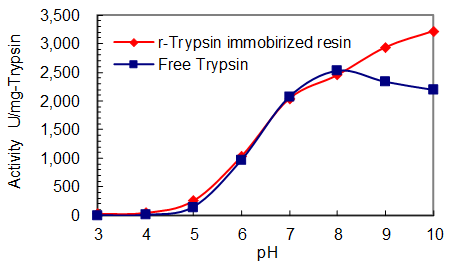
The r-trypsin-immobilized resin exhibits excellent trypsin activity under a wide range of pH conditions. Compared to the free Trypsin, it shows high enzyme activity even under highly alkaline conditions after pH 9.
Excellent durability in high temperature conditions
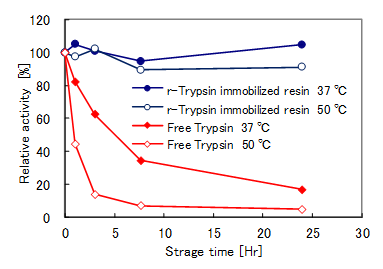
The r-trypsin immobilized resin can be used under high temperature conditios. It maintained trypsin activity even under high temperature conditions of 50 °C. It can be seen that the r-trypsin immobilized resin suppresses autolysis by immobilizing trypsin on the resin.
Trypsin activity in organic solvents
The r-Trypsin immobilized resin maintains the same activity as the free Trypsin even in the common organic solvents used in insulin production. A certain concentration of organic solvent reduces enzyme activity, but it does not be caused inactivation. Activity of r-Trypsin immobilized resin is maintained when the solvent is removed.
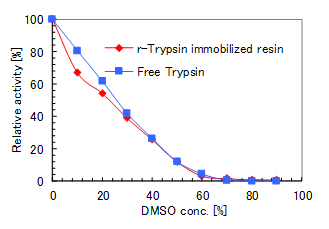
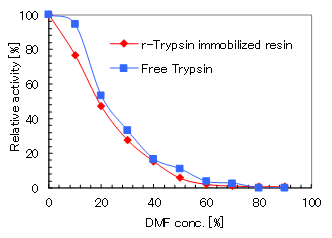
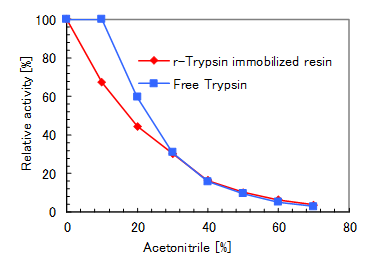
Clean-in-place (CIP) of r-Trypsin immobilized resin
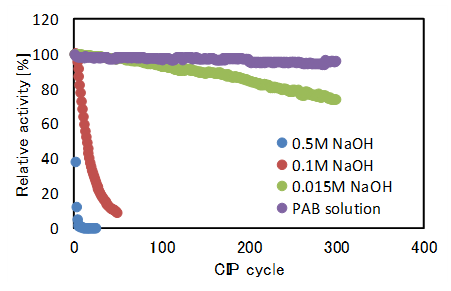
The r-Trypsin immobilized resin has the general characteristics found in protein immobilized resin, that it has low resistance to NaOH because it immobilizes the protein. However, when CIP with 0.015 M NaOH, it maintained 85% activity in 200 cycles test.
In a test using an acidic CIP solution PAB, the activity was maintained even after 300 clean-in-place cycles.
Stability with organic solvents
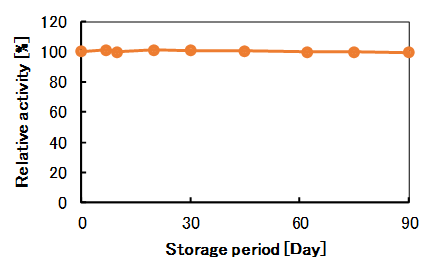
The r-Trypsin immobilized resin is extremely stable in organic solvents. It maintained trypsin activity after 90 days of storage.
